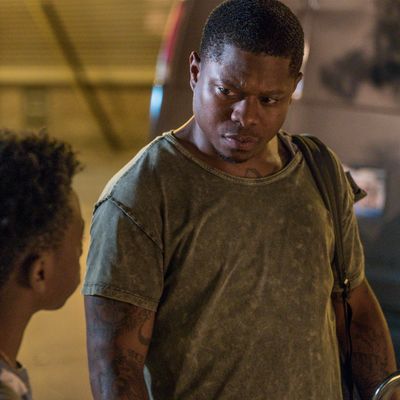
The Chi could have been called The Too. Created and written by Lena Waithe (the Emmy-winning co-star and co-writer of Master of None), this new Showtime series about a South Side Chicago neighborhood has too many characters and too much plot for its own good, and some of the individual scenes and narrative leaps are too short or too choppy to sink in as completely as they hope to. Everything is a little too this or too that, and by the time we get to the end of the first season, I wouldn’t be surprised if the series still feels like a work-in-progress. But none of that ultimately matters much, because the characters, the atmosphere, and the feeling of the show are so assured, and the sense of life is so exuberant and personal. This is a TV series that loves its characters and appreciates the environment they move through. It keeps surprising you with the connections between people, as well as the choices that individuals make in the moment.
The Chi is what the film scholar David Bordwell dubbed a “network narrative,” driven not so much by forward-moving, goal-oriented plotting but chance meetings, coincidences, and the audience’s gradual discovery of the connections between characters. That’s why I don’t want to describe the relationships in too much detail here; I was consistently surprised by who ended up related to whom, by blood or by circumstance. I can tell you that there’s a teenager named Coogie (Jahking Guillory), who has huge, frizzy, borderline Sideshow Bob hair and rides his bike all over the neighborhood, and that his initial discover of a murder victim (and his theft of the young man’s shoes and necklace) sets the story in motion, affecting every other character. Coogie’s older brother Brandon (Jason Mitchell) works in the kitchen of an upscale restaurant and wants to move up to line cook and eventually open up his own restaurant with his girlfriend, Jerrika (Tiffany Boone), but can’t quite summon the nerve. There’s also an elementary-school kid named Kevin (Alex Hibbert, star of the first part of Moonlight) who tries out for a school production of The Wiz mainly to impress a girl he’s sweet on. Kevin has an older sister named Keisha (Birgundi Baker), who’s in love with a materialistic stud named Emmett (Jacob Latimore), who also has another girlfriend with a baby that may or may not be his. Emmett’s mother, Jada (Yolonda Ross), is a registered nurse who allows him to live with her even though he smokes weed and sleeps with girls in his room and doesn’t seem inclined to take responsibility for anything. And there’s a tough loner named Ronnie (Ntare Guma Mbaho Mwine), whose porkpie hat and leather jacket make him look like an undercover cop from a ’70s New York movie. Ronnie is still fond of his ex-girlfriend Tracy (Tai Davis) and loves her teenage son as if he were his own flesh and blood.
I kept writing and then deleting other sentences in the above paragraph because I realized I was prematurely spoiling things — not “twists” in any real sense of the word, but little details that make The Chi feel so alive. There are moments when characters are revealed to be much worse or much better parents than you might have imagined when you first met them, and scenes where somebody reveals a previously unsuspected affinity or talent, or makes a choice that feels random and forced until you spend a bit more time with them and realize it was exactly what somebody like that would do under those circumstances. The pilot, directed by Rick Famuyiwa (The Wood, Brown Sugar), introduces all the aforementioned figures plus many more — including a depressive, volatile mom played by Sonja Sohn of The Wire — and the direction and writing become more focused as the series goes on. It tries to do too much in the hours that it has, and I’ll admit some trepidation about seeing yet another drama about the lives of people of color where the subplots are stitched together by violent crimes, as excellent as many of those series have been. (Can’t somebody do, basically, The Carmichael Show, but as a drama? Or is that not allowed?) But the crimes are sensitively handled by all concerned, and they end up illuminating gun violence in a manner rarely shown on television, as well as the mutually distrustful relationship between police and the people they’re supposed to serve and protect. There are a lot of conversations on this show about how the government and its representatives in uniform just aren’t interested in solving crimes of this nature when the victims are black. This fact is presented not as a revelation, or even with great anger, but with hardened sorrow, bordering on numbness.
My colleagues seem to be instinctively comparing The Chi to The Wire, perhaps because it’s set in the inner city, has a predominantly African-American cast with a Wire alum, and features a main plot that’s driven by a couple of violent (though sadly ordinary) crimes. But it ultimately has more in common with another David Simon series, Treme, and with Showtime’s Shameless, in that it’s mainly concerned with the lives of working-class and poor people struggling to survive day-to-day, rather than the system they’re struggling within. It’s a rare drama that bothers to remind us that even when somebody in your family dies unexpectedly, you still have to work, pay rent, and drive mom around. Yet, somehow, for all the occasional horror and persistent indignity, life goes on here, every day, every minute, and The Chi appreciates that as well, often pausing to take in the beauty of an intricately painted mural on the wall of a bodega, or the way the orange sunset light glints off the side of an elevated train rounding a curve.


